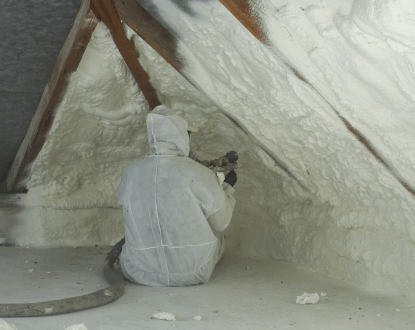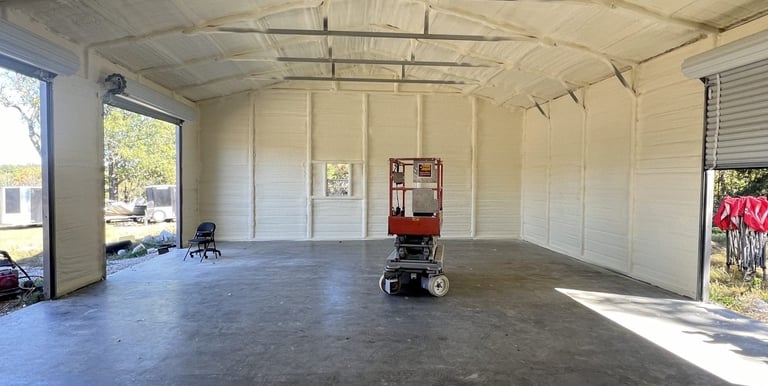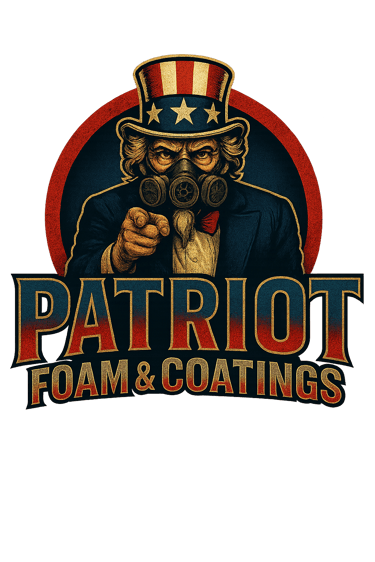Foam Solutions
Expertise in Open and Closed Cell Spray Foam Services
Types Of Spray Foam




Open Cell
Interior walls for sound control
Attic floors and roof decks
Ceilings and vaulted ceilings
Bonus rooms and lofts
Between floors in multi-level homes
Interior partitions in residential and commercial buildings
Home theaters or media rooms
Light commercial spaces where air sealing is important
Areas needing an air barrier but vapor permeability
Closed Cell
Crawlspaces and basements
Metal buildings and pole barns
Roof decks and flat/low-slope roofing systems
Exterior walls and building envelopes
Garages and workshops
Agricultural structures (barns, livestock areas)
Cold storage and refrigerated spaces
Shipping containers and storage units
Areas exposed to moisture or extreme temperatures
Surfaces needing added structural strength and rigidity
Open-Cell Spray Foam Insulation FAQ
Q: What is open-cell spray foam insulation?
A: It’s a lightweight foam that expands to fill gaps, creating an air-tight seal ideal for interior walls, ceilings, and sound control.
Q: How is open-cell different from closed-cell spray foam?
A: Open-cell is softer, more flexible, and better for sound absorption, while closed-cell is denser and more moisture-resistant.
Q: Is open-cell spray foam good for soundproofing?
A: Yes, its open structure absorbs sound very effectively, making it great for interior walls and living spaces.
Q: Can open-cell spray foam help lower energy bills?
A: Absolutely. It creates an air-tight barrier that helps maintain indoor temperatures and reduces HVAC workload.
Q: Is open-cell spray foam safe?
A: Yes, once cured, it’s safe, non-toxic, and does not release harmful fumes.
Q: Where is open-cell spray foam commonly used?
A: Interior walls, attics, ceilings, and areas where sound control and air sealing are important.
Q: Does open-cell spray foam absorb moisture?
A: It can allow vapor to pass through, which is useful in areas where breathability is needed, but it’s not recommended for high-moisture or exterior applications without a vapor barrier.
Q: How long does open-cell spray foam last?
A: When professionally installed, it can last the lifetime of the building without sagging or settling.
Closed-Cell Spray Foam Insulation FAQ
Q: What is closed-cell spray foam insulation?
A: It’s a dense, rigid foam that provides high R-value per inch and adds structural strength while creating an air- and moisture-resistant barrier.
Q: How is closed-cell different from open-cell spray foam?
A: Closed-cell is much denser, offers greater insulation value, resists moisture, and adds rigidity to surfaces, while open-cell is softer and better for sound control.
Q: Is closed-cell insulation waterproof?
A: It is highly moisture-resistant and can act as a vapor barrier, making it ideal for roofs, crawlspaces, basements, and metal buildings.
Q: Does closed-cell spray foam improve energy efficiency?
A: Yes, its high R-value and air-sealing capability help significantly reduce heating and cooling costs.
Q: Where is closed-cell spray foam commonly used?
A: Crawlspaces, roofs, metal buildings, basements, pole barns, and exterior walls needing moisture control and durability.
Q: Can closed-cell spray foam strengthen a structure?
A: Yes, its rigid nature can enhance structural integrity of walls, roofs, and metal buildings.
Q: Is closed-cell spray foam long-lasting?
A: When installed properly, it can last the life of the building without sagging or deteriorating.
Q: Is it safe once cured?
A: Yes, once fully cured, it is safe, stable, and does not emit harmful fumes.

